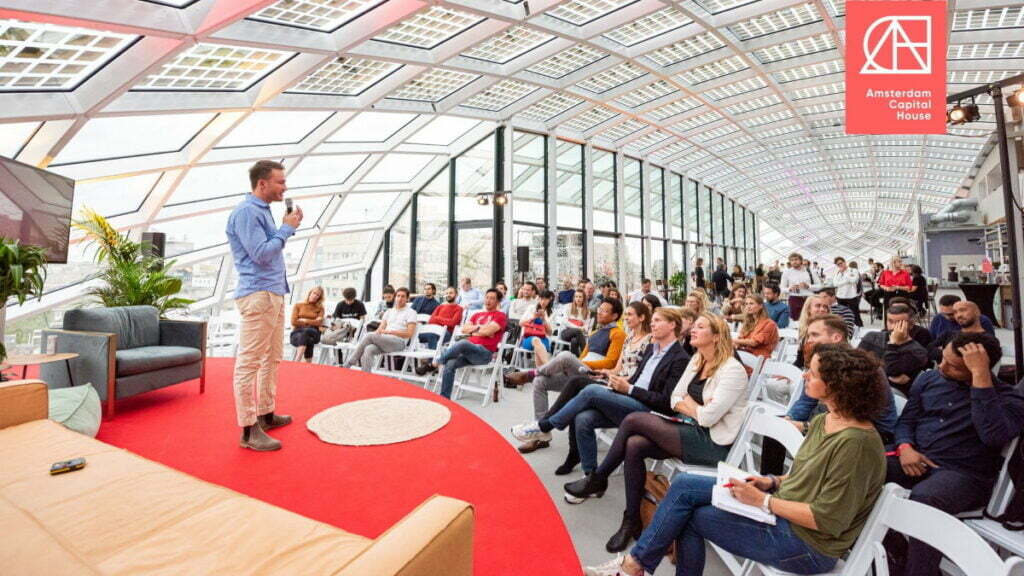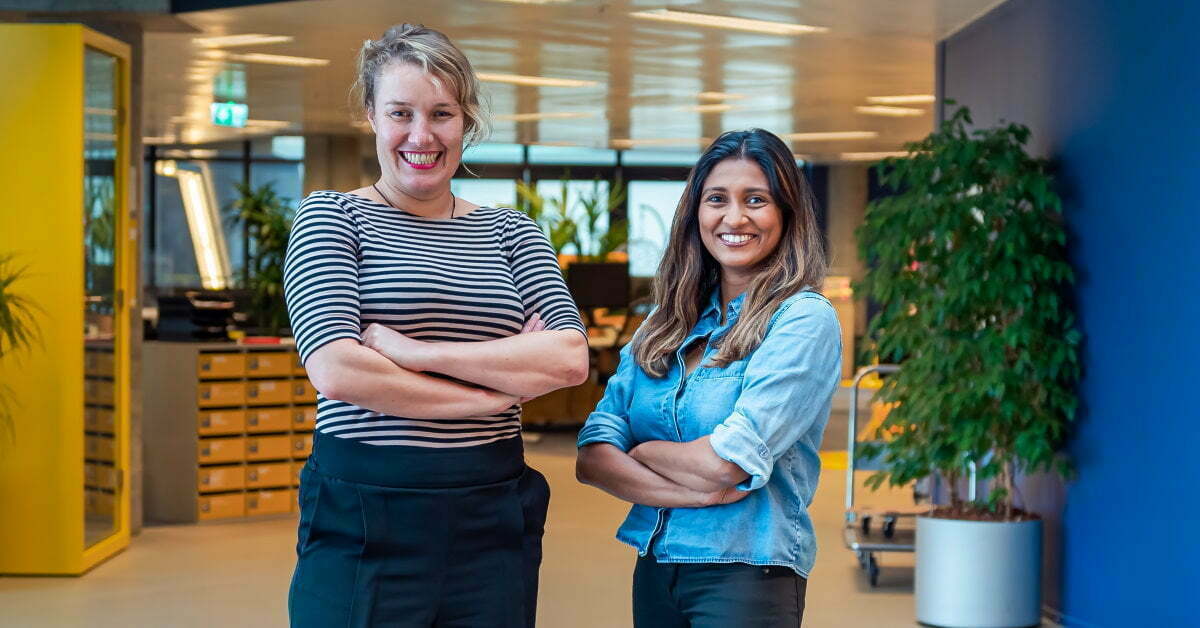Quan founders Lucy Howie and Arosha Brouwer (image: Quan)
Capital is the lifeblood of any business, and it comes in many shapes and sizes. Whether human, social or financial capital, founders are always looking to obtain and maintain. That will be the central question during Amsterdam Capital House 2022, held March 23rd till 25th.
Amsterdam as Capital city
Amsterdam Capital House is a three-day founder-focused program dedicated to creating meaningful connections with capital. That means a lot of sessions with insights from seasoned investors. It also means there are founders there to share their knowledge on raising capital.
SMBs prioritise customer and employee engagement as they tackle pandemic.
One of those founders is Arosha Brouwer, co-founder and CEO of HR-tech startup Quan. Her year-old startup recently raised over €1 million in pre-seed after they got accepted in Y Combinator. Brouwer went from chasing investors to being chased by them.
Do something amazing
“We’re barely a year into it, but being open to listening and learning has let us take giant leaps forward”, Brouwer explains their quick ascent. If the past year has taught her anything, it’s that chasing VCs is a waste of time. “Remember that if you are doing something amazing, investors will want to be a part of that.”
It’s something that Brouwer wished she’d had known a year earlier, as this would’ve saved her from pitching too early on. Instead, Y Combinator taught her to put that energy into her business. “The first six weeks, you are razor focused on validating your concept and building traction. They drill that into you. Ultimately, it is your team and traction which speaks best to potential investors. As a founder, you should be interviewing VCs as much as they interview you.”
The story of Quan
Quan has developed science-backed software to assess the well-being of individuals and teams, and connect them with the most relevant interventions to address areas where they struggle most. So instead of offering generic perks and hoping it keeps everybody happy, managers and teams can take immediate action. Employers can monitor the well-being of their teams, measure the ROI of the benefits they offer, and adjust their ways of working accordingly. Leveraging Brower’s extensive research and background in the space of organisational culture, Brouwer and co-founder Lucy Howie launched their software in March 2021.
It’s only a short while ago, but Quan has accomplished quite a bit since then. They’ve gathered over 1000 active users across r12 different organisations. They’ve also raised quite a bit of pre-seed funding: €1,03 million. Financial backing from Y Combinator opened that door for them. Alongside the investment from YC, Quan also raised capital from 4impact, 3C Ventures, Invested, and an unnamed angel in their first round.
“when you are an early-stage software startup, it is easy to think you’re only successful when you raise VC funding. Startups are constantly looking for validation from VCs, but that’s wrong. It comes down to product-market fit, so the only type of validation you should be chasing is from your customers. If they are willing to pay for your product, then you know you’re onto something. At the end of the day, VCs expect you to understand your market and problem space like no one else – that’s why they’re willing to take a bet on you.
Volta Ventures offers ‘roadmap to exit’
That is why VCs often don’t look at what you’re doing but more at who you are. Kyra Dresen is Junior Associate at Volta Ventures and during Amsterdam Capital House, she’ll be hosting a ‘Roadmap to Exit’ session. She explains what they are looking for in startups to invest in. Having a stellar product helps, sure. But, more importantly, they need confident yet coachable founders. Ones ‘with the ability to recruit good people, and to hire the smartest person in the room, without necessarily being the smartest person in the room themselves.’

Dresen: “I think founders are aware of what we’re looking for, but the formatting of the team in the pitch deck and the communication during the pitch can be more precise. Often, one sees the name and a few big logos of former employees, which is not something we can extract a lot of information from. What for us is interesting to know is the experience you have gathered in those former roles, which make you know a more suited candidate to solve this issue and grow this company.”
Raising awareness
As the name of her session implies, Dresen urges founders to look forward towards an exit when talking to investors. “The main thing I hope to trigger in founders by hosting the Roadmap to Exit panel talk is awareness around the exit trajectory in general, and the factors and stakeholders that impact it.”
“Most investors think about potential exit opportunities from the moment they speak with a startup. I believe being more aware of this as a founder can not only help you understand the reasoning of investors but also help you in strategic decision making.”
4Impact: How to get to Series A with impact investors
One of the investors that participated in Quan’s recent funding rounds is the Amsterdam-based fund 4Impact Venture Capital. Co-founder Ali Najafbagy will join the fireside chat with Arosha Brouwer during Amsterdam Capital House to discuss their decision to jump aboard. With the ability to prevent health issues among employees, Quan was an excellent fit for the Health and Well-being pillar of the impact-driven fund.
During Amsterdam Capital House, Ali’s 4Impact colleague Pauline Wink will host a session on How to get to Series A with impact investors. For 4Impact, the social capital is equally important, says Najafbagy: “Systemic change is the impact we as an investor and the founders focus on. Before achieving impact there are outputs and outcomes which relate directly with the fast paced startup business. During our session, we will explain how this works.
Becoming a household name
Thanks to the funding, Quan can keep growing. And it is doing well, Brouwer says. How well precisely, she won’t say. Y Combinator’s demo day is coming up, and she keeps the exact numbers under wraps until then. They already had Bynder and Arcadis on board; recently, they also added Amsterdam-based medtech company Aidence and Monash University in Australia, further underlining their global ambitions. Brouwer reveals that they are already looking at a new funding round to accelerate their growth.
The goal for Quan is to become a household name. Asked what the goal is for the next five years, Brouwer says: “The Quan well-being index is being used as a standard across organisations to ensure proper help is provided for individuals and teams to improve.”
Want to learn more? On March 25th, Amsterdam Capital House 2022 will hold a fireside chat organised by StartupAmsterdam with Arosha Brouwer and Ali Najafbagy. The talk will be followed by a ‘Walk and Talk’, where startups can meet investors and go for a walk in Oosterpark Amsterdam. More info on the event can be found here.
How partnering up with Salesforce helped him succeed!





![Read more about the article [Funding alert] Mumbai-based supply chain startup Elixia Tech Solutions raises $1M in pre-Series A round](https://blog.digitalsevaa.com/wp-content/uploads/2021/09/Feature-Images-YS-1630913346077-300x150.png)




